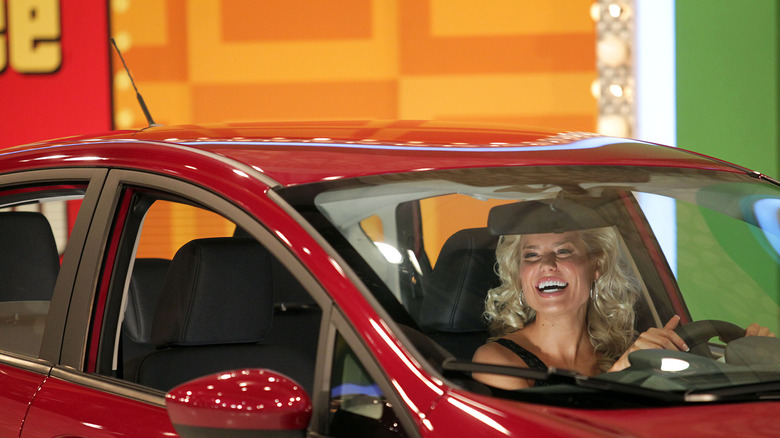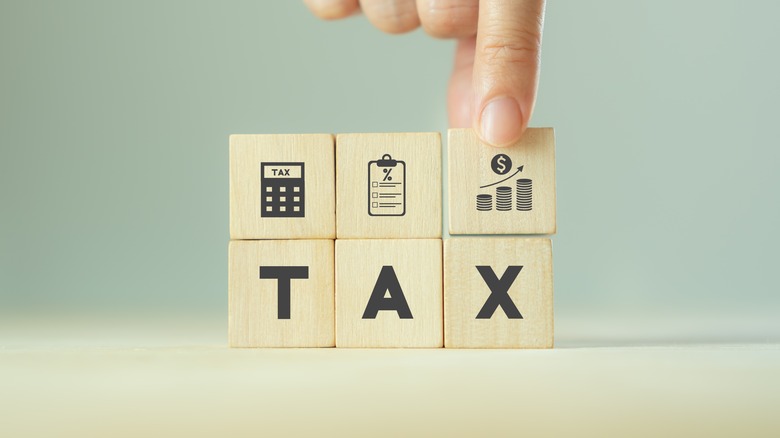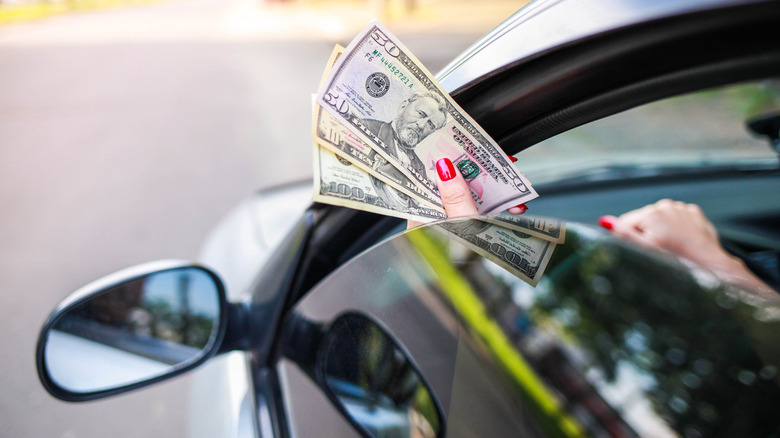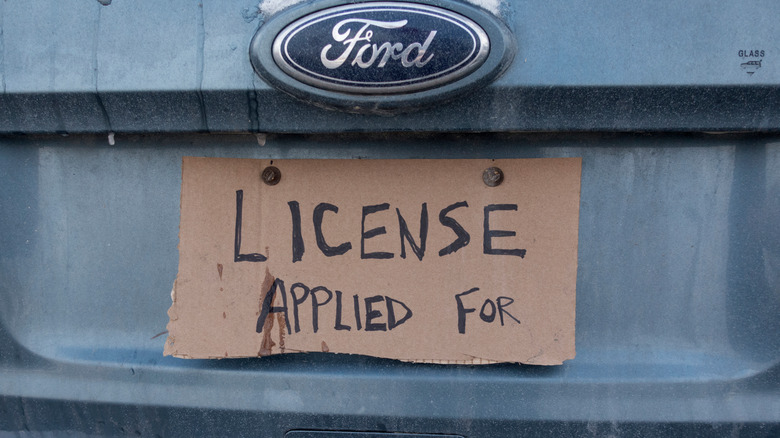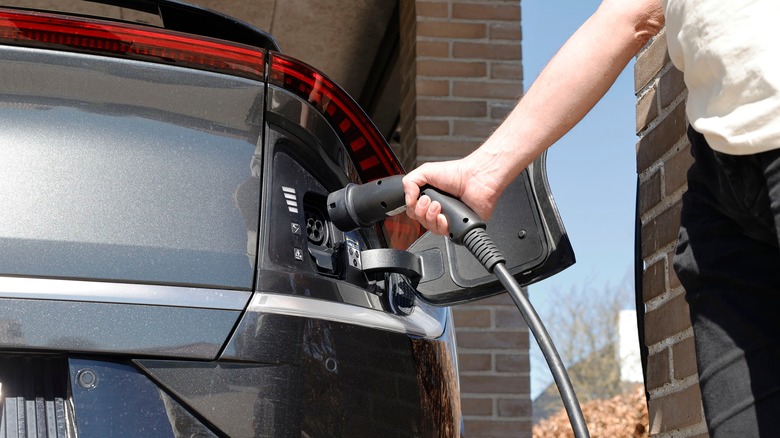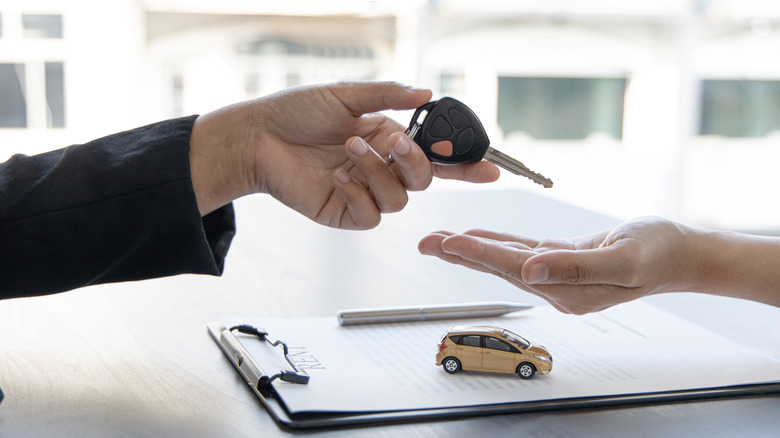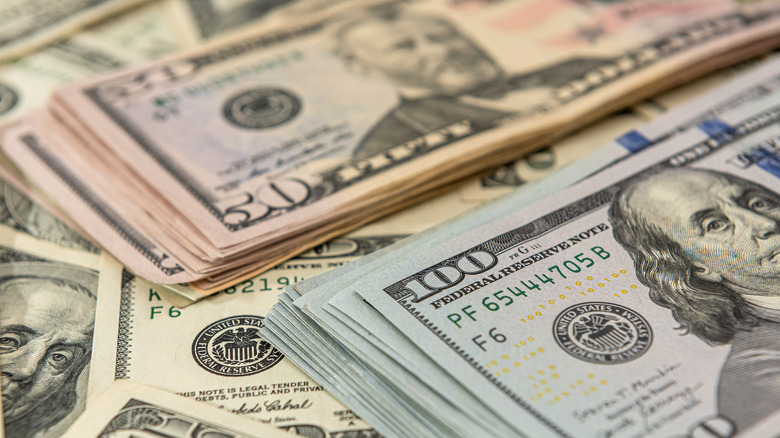Why Winning A Car May Be More Trouble Than It Is Worth
Winning a car is one of those things you dream about while living in the U.S. From the vehicle parked at the local strip mall that you have to purchase raffle tickets for, to dealerships giving them away to entice more test drives, to grand prizes in game shows like "The Price Is Right," it seems there's always a car right there in reach if your name was just a little bit luckier.
Everything in life has a cost, however, and not all that glitters is gold. If you win that car, you could be setting things up for financial ruin, or at least some short-term pain. There are obligations that every winner has to think about, which are usually hidden behind the glitz and glamor of the big contest. The prices on the game show stage aren't the only ones that the contestants have to contend with, and that could sour the adrenaline high from winning the big prize.
You'll have to pay taxes
So you've just won a snazzy new ride in a game show or raffle, like this sporty 2021 Toyota Camry TRD which retailed for $32,260 (plus $995 destination). Congratulations — but before you start dreaming about the best driving roads near you, it's time to consider your tax obligations. Per Nerdwallet, any prizes worth $600 or more in the U.S. are subject to federal taxes and will be taxed between 10% and 37% depending on your tax bracket.
Then, expect to pay state taxes of up to 9%. The only states that won't make you pay additional taxes on your winnings are the nine that don't have an income tax, which are Alaska, Florida, Nevada, New Hampshire, South Dakota, Tennessee, Texas, and Wyoming, according to AARP. Depending on your state and city, you might also be on the hook for local taxes. For example, Maryland allows counties and cities to levy additional taxes, which is between 2% and 3.2% depending on where you live.
You might have to pay before you drive off
Game shows, including "The Price is Right," make you pay the taxes upfront before they contact a dealership near your home to arrange your newly won car. According to app., that's what happened to Debra Field, one of the winners of the most iconic prize on a 2020 episode of "The Price is Right." The flight attendant had to sign forms after the show that spelled out how much in California income tax she'd have to pay to get all her winnings, including the car. Then a week before the show aired on TV, she got a letter from the show's accountants asking for the taxes. One certified check for the agreed amount was sent in the mail, and the grand prize was finally hers.
The show then contacts a local dealership to get your car to you. In this case, it was a dealer in New Jersey. Expect to pay taxes on the whole sticker price. Dealerships and the show will value the vehicle at the MSRP, not a dollar less. That's true even if the prize is paid out in the months that dealerships are often heavily discounting their inventory, like the clearout in December to get lot space for the incoming year's ranges.
You might get spared sales taxes
While many game shows don't pay taxes on the winner's behalf, that's not always the case. It's up to the sweepstakes organizer if they want to pay the sales tax, and some opt to pay sales tax or even give enough cash to cover any federal or state income taxes.
The most famous occurrence of cars being given away was on September 14, 2004, when Oprah Winfrey gave a car to everyone in her audience that day. The crowd was ecstatic, as the producers had been told to find an audience who "desperately needed" a new car. According to History, the show pushed Pontiac to donate 276 cars, which paid for it out of its yearly advertising budget. The stunt went well, although the audience hadn't counted on a $6,000 federal tax bill on their next year's taxes. Oprah's production company paid the state sales tax on each of the vehicles, but the federal bill was still looming. Some recipients took out loans to pay the tax burden, while some traded their vehicles for cheaper, less-premium ones.
Your insurance will go up
Expect to pay for adding your new vehicle to your existing insurance policy. This is generally less than the price of two full policies, but it depends on the type of car you just won, your driving history, where you live, and any other factors the insurer wants to look at. Sports or luxury cars will cost more, as they are riskier for the company to insure.
For some states and insurers, you have a grace period before informing them about adding a new vehicle to your policy. WalletHub says that could be as few as 10 days for Nationwide or as long as 30 days for Progressive, Geico, or Farmers. Some states don't allow for a grace period; New York is one of these. If you live in one of these states, you'll want insurance before going to the dealership to pick up your new car. Some dealerships will still want to see insurance before they will let you drive off. This could be your existing policy, especially if you have a grace period, or they might ask for you to add the new car to your policy before taking possession.
You'll have to get it road ready
Now you are in possession of your newly won car, but that doesn't mean you can drive it around yet. You need to do a few things at your local Department of Motor Vehicles before you can proudly drive your car. The dealership should have given you temporary tags, which typically give you 30-90 days (depending on the state) to register your vehicle with the DMV. You might have been lucky enough to have a dealership that can register the vehicle and get you permanent plates before you drive away, but if not, you'll have to go down to the DMV. You will need the title, proof of insurance, and possibly an emissions test certificate from the state. Some states don't need an emissions test for a number of years if the car is brand new, so check with your local DMV before going down to the dealership.
Before leaving the dealership, you might want to add extended service contracts, undercoating, paint protection, or any of the other additional services that the dealership provides. This will come out of your pocket, as the prize is likely the base car without service contracts, protectants, or additional accessories.
You'll have ongoing costs
The ongoing costs of ownership might put you off from saying yes to that car you won. You don't have a car payment, which is half of the general cost of any new car. If we take the 2023 version of the Toyota Camry TRD we used earlier, the $39,487 dealership price means a $684 monthly loan payment spread over 60 months is avoided because you just won it. The fuel efficiency of that car is 22 miles per gallon city, 31 miles per gallon highway. If you drive that car 15,000 miles over the next year, you want to budget around $140 a month for gas, based on the AAA national gas price average of $3.42 as of this writing – assuming you do mostly highway travel.
Edmunds has a handy ownership cost calculator, which says that a 2023 Toyota Camry TRD will only cost you $49 on average in maintenance in the first year, but that rises to $3,935 after five years. That first year might even be $0 if your dealership offers free services. Insurance we covered earlier, without a dollar amount. Budget another $100-150 per month, even with multi-car discounts. Then it's another $10 monthly for registration, taxes, and fees. If you have to pay for parking, you could pay as much as $340 a month if you live in a bustling metropolis like San Francisco. Last, expect your car to depreciate by around $6,958 in the first year, based on Edmund's cost calculator for the aforementioned Camry TRD.
You might have to upgrade your home
With the push towards electrification, you might find the car you win is either a plug-in hybrid or an electric vehicle. You won't have any ongoing costs for gas, getting away from the rollercoaster of prices at the pump. The addition of an electric vehicle to your home does bring its own issues. You'll want to add a charging station, which comes with its own set of fixed costs. In August 2022, HomeAdvisor listed the average national cost for an electric vehicle charging station as $833. That's the average of both Level 1 charging stations (like the charger your new EV likely came with), and Level 2 charging stations that charge faster and need professional installation.
You'll probably want a Level 2 charging station, which will cost between $800 and $2,000. This is a dedicated 240V circuit that is separated from the rest of your house's electrics. The big draw here is that you can charge your EV in hours instead of overnight. You might also qualify for tax rebates or credits depending on the rest of your financial situation, lessening the sting of installing the charging station.
You could always just sell it
If you won a car or any other vehicle and didn't intend to keep it, you can always sell it. It is yours now — just know you'll have to set aside more money to pay taxes on the sale. You already know that the car is brand new, but it won't be if you drive it off the dealership's forecourt. The best place to get top dollar for that brand new car is to sell it right back to the dealership before you've even turned the key for the first time. That way, they can still sell it as new, or at the very least, not-driven with zero mileage.
If the dealership won't play ball for some reason, it's up to you to sell things. It might be a wise decision to get someone to haul the car to your house, so it doesn't pick up any additional miles on the odometer. You won't have to get it serviced or most of the other tweaks recommended for the best sale value, but it's probably good to get it detailed or at least wash the outside. You might not even have to talk to anyone for a private sale. Many sites like Carvana, Give Me The VIN, or CarMax will buy your car, and even pick it up from you if you're in an area they service.
You might be better off with the alternative prize: cash
This won't work with all contest organizers, but many will offer a comparable cash prize in lieu of the car. This is most likely to work when a casino runs the show, as it will offer the vehicle, cash, or casino credit to keep playing. Take the cash and run. Jon Friedl, aka Professor Slots, chronicled his journey to winning a luxury Mercedes-Benz that was prominently featured at a "local casino." The contest was based not on tickets or any specific buy-in, but based on the "play over the last few months" for the casino's players.
That meant that he could stack the deck in his favor, as he was already frequenting the casino to play high-stakes slot machines. He did his homework first, as he didn't want to be saddled with yet another car he'd have to pay other costs for. He asked the casino if they had alternative prizes, such as cash. He also checked the Kelly Blue Book prices for a used Mercedes-Benz of the same year and model — he assumed that because the car had been sitting in a casino it meant it was no longer brand new. The casino got back to him and said that a $40,000 cash alternative was an option if he was to win. And that's what he did: won the car in the prize drawing, and stuck to his choice of a cash payout.
You might want to reject it completely
Nobody says you have to accept the car, even if your first instinct is to jump up and down screaming, because it's not every day you win a car, right? The number of downsides could mean that turning down the prize is more financially beneficial. That could be as simple as not having the required tax payments to accept the car once the show is over. One "The Price Is Right" winner took to Reddit to talk about their experience and said that you have to reject the car if you can't come up with the cash to pay for the state taxes, or you're unwilling to go into debt taking out a loan to pay for them. They did say that "everyone accepted" during their recording, so nobody did reject the car, but it is an option.
The other option is to take the car, pay the state taxes, and then donate the car to a charitable organization before your federal taxes are due. Check your local DMV for a list of regulated charities that you can donate the vehicle to so you get all the correct paperwork when you file your taxes. Most programs sell the vehicle at auction, then give you a 1098 form for your taxes, as you can claim the value it sold for as a tax deduction.
